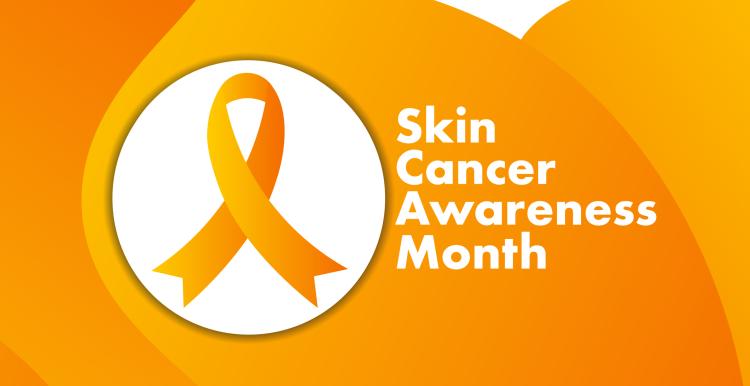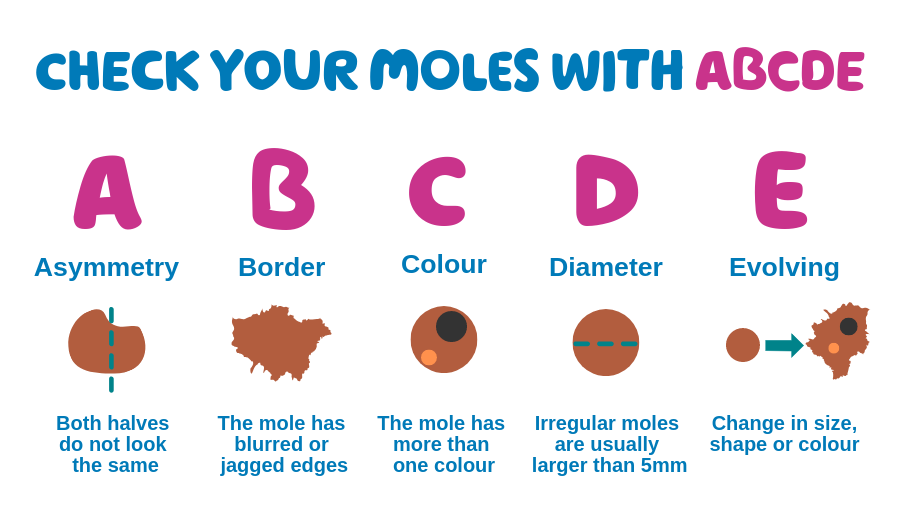Skin Cancer Awareness Month
Most skin cancers are caused by skin damage that happens from exposure to ultraviolet (UV) light from the sun. All types of skin are at risk of sun damage and skin cancer.

What are the different types of skin cancer?
There are three main types of skin cancer
- basal cell carcinoma (BCCs)
- squamous cell carcinoma (SCCs)
- melanoma.
BCCs and SCCs are different from melanoma. They are called non-melanoma skin cancers and are more common than melanoma, which can be more serious.
What is the main cause of skin cancer and am I at risk?
Most skin cancers are caused by skin damage that happens from exposure to ultraviolet (UV) light from the sun. All types of skin are at risk of sun damage and skin cancer.
Those who are most at risk of developing skin cancer are fair-skinned people who tend to burn easily, or freckle in the sun. People with darker skin still have a risk of developing skin cancer.
It is important for everyone to follow skin protection advice and to check their skin regularly. Find more information about causes and risk factors of non-melanoma skin cancer and causes and risk factors of melanoma.
What can I do to prevent skin cancer?
The best protection is to cover up and be safe in the sun. It’s important to check your skin regularly for any changes. Macmillan have more information about preventing skin cancer.
How can I be safe in the sun?
- Macmillan recommend 5* UVA with at least an SPF 30.
- Drink plenty of water. Cover up with a hat and long sleeves. Wear a wide-brimmed hat to protect your face and neck.
- Wear UV blocking sunglasses to protect your eyes.
- Don’t forget to apply sun cream to those easy to miss places - lips, tops of ears, back of neck, feet and scalp.
- Limit your time in the sun and stay in the shade between 11am and 3pm.
- Do not let your skin go red or burn.
- Do not use a sunbed or sunlamp. If it is important for you to look tanned, use fake tan lotions or sprays.
When to get medical advice
See a GP if you have any skin abnormality, such as a lump, ulcer, sores that are not healing, lesion or skin discolouration that has not healed after 4 weeks. Also report any changes in the skin such as moles that have changed shape, colour or size. While it's unlikely to be skin cancer, it's best to get it checked.
Regularly checking your skin for signs of skin cancer can help lead to an early diagnosis and increase your chance of successful treatment.
More information on skin cancer awareness, from Macmillan.
More information on skin cancer, from the NHS.
Support available:
Widnes & Runcorn Cancer Support Group
Widnes and Runcorn Cancer Support Group offer support to those in the Halton area whose lives have been touched by cancer. Anyone who has been affected by cancer or by the suffering of a friend or relative is welcome at the Centre.
Offer support groups, counselling, beauty treatments, information and more.
http://www.widnesandruncorncancersupport.org.uk/
Call: 0151 423 5730 Email: info@widnesandruncorncancersupport.org.uk
Help from Macmillan
Macmillan offer practical and emotional support to people affected by cancer.
Find details on the Macmillan helpline, email support and online chat.



